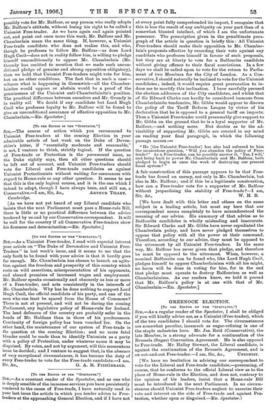[To MP EDITOR OP /MP ".SPECTATOR.']
Sin,—As a constant reader of the Spectator, and as one who is deeply sensible of the immense services you have persistently rendered to the cause of Free-trade, I have naturally read in your last issue the article in which you tender advice to Free- traders at the approaching General Election, and if I have not
at every point fully comprehended its import, I recognise that this is less the result of any ambiguity on your part than of a somewhat blunted intellect, of which I am the unfortunate possessor. The prescription given in the penultimate para- graph of the article in question is briefly this :' All Unionist Free-traders should make their opposition to Mr. Chamber- lain's proposals effective by recording their vote against any candidate who professes himself in favour of such proposals, but they are at liberty to vote for a Balfourite candidate without giving offence to their fiscal convictions. In a few days we shall be called upon to vote for the return to Parlia- ment of two Members for the City of London. As a Con- servative, I should naturally be inclined to vote for the Unionist candidates ; indeed, it would require great provocation to in- duce me to mortify this inclination. I have carefully perused the election addresses of the City candidates, and whilst that of Sir Edward Clarke can hardly be considered immune from Chamberlainite tendencies, Mr. Gibbs would appear to disown the policy of the Tariff Reform League by virtue of his declaration that he is opposed to a general tariff on imports: Thus a Unionist Free-trader could presumably give support to Mr. Gibbs on the ground that he is a loyal supporter of Mr.
Balfour,—and nothing more. But doubts as to the ad- visability of supporting Mr. Gibbs are created in my mind on reading your final paragraph, in which the following passage occurs :—
"He [the Unionist Free-trader] has also had referred to him the momentous question, Will you abandon the policy of Free- trade ? ' As a Free-trader, can he possibly answer it, ' Yes, I will,' and bring back to power Mr. Chamberlain and Mr. Balfour, both pledged 'to begin at once the work of destroying our present fiscal system ? "
A fair construction of this passage appears to be that Free- trade has found an enemy, not only in Mr. Chamberlain, but also in Mr. Balfour; and if this be a legitimate construction, bow can a Free-trader vote for a supporter of Mr. Balfour without jeopardising the stability of Free-trade P—I am, [We have dealt with this letter and others on the same subject in a leading article, but must say here that our correspondent seems completely to have misunderstood the meaning of our advice. His summary of that advice as to Balfourite candidates is wholly misleading and inaccurate.
Sir Edward Clarke and Mr. Gibbs have never repudiated the Chamberlain policy, and have never pledged themselves to oppose that policy with all the power at their command.
Therefore, according to our advice, they must be opposed to the uttermost by all Unionist Free-traders. In the same way, Mr. Balfour has never given that pledge, and therefore he must be opposed to the uttermost. When, however, a nominal Balfourite can be found who, like Lord Hugh Cecil, pledges himself to oppose Chamberlainism with all his might,
no harm will be done in voting for him, for in the end that pledge must operate to destroy Balfourism as well as Chamberlainism. As our readers know, we hold it proved that Mr. Balfour's policy is at one with that of Mr. Chamberlain.—ED. Spectator.]










































 Previous page
Previous page